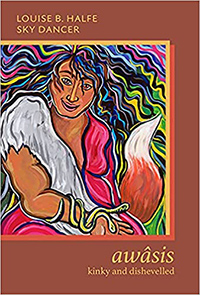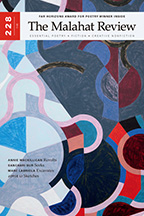Reviews
Poetry Review by Jay Ruzesky
Louise B. Halfe – Sky Dancer, awâsis – kinky and dishevelled (Kingston: Brick Books, 2021). Paperbound, 86 pp., $20.
 awâsis – kinky and dishevelled by Louise Bernise Halfe – Sky Dancer is a
surprising, sometimes gentle, often frank, comic exploration of a set
of “wawiyatâcimowinisa—funny little stories” (as she refers to them in
her “Acknowledgements”) collected and told by a writer who has been
for three decades at the forefront of a wave of Indigenous voices in
Canadian Literature, and who now holds the post of Canada’s Parliamentary
Poet Laureate.
awâsis – kinky and dishevelled by Louise Bernise Halfe – Sky Dancer is a
surprising, sometimes gentle, often frank, comic exploration of a set
of “wawiyatâcimowinisa—funny little stories” (as she refers to them in
her “Acknowledgements”) collected and told by a writer who has been
for three decades at the forefront of a wave of Indigenous voices in
Canadian Literature, and who now holds the post of Canada’s Parliamentary
Poet Laureate.
Maria Campbell, in her “Introduction,” says this book is “all about
Indigenizing and reconciliation among ourselves. It’s the kind of
funny, shake‐up, poking, smacking, and farting we all need while
laughing our guts out.” In a world where the media tends to highlight
the mass graves of children at Residential Schools, it is a pleasure to
have attention focused on a more rounded, rich, funny element of
Indigenous life, and, as Campbell also says, awâsis is “beautiful, gentle,
and loving” at a time when those things seem especially necessary.
Halfe – Sky Dancer is a Cree poet who was taken to Residential
School as a child and raised there until she was sixteen. Her 2016 book,
Burning in This Midnight Dream, reviewed in The Malahat Review 197
(Winter 2016), tells stories of Residential School survivors including
her “Dedication to the Seventh Generation,” which incites readers to
weep “for those who haven’t yet sung” and those “who will never
sing.” But her latest collection is something else: an ameliorative
chorus of voices this time “celebrating awâsis, the adult child within.”
Halfe is a gentle teacher. She explains that “awâsis means more than
child. It translates to ‘being lent a spiritual being.’ awâsis celebrates and
helps us to laugh at ourselves and our follies.”
While readers are encouraged to laugh, there are also lessons here
and they are offered in a generous way. One of the things the book
explores is language, both English and nêhiyawêwin. The first time
Halfe uses a Cree word like nêhiyaw, for example, she provides an
English translation in the margin so we (by which I mean “we who do
not already know”) learn the word for Cree, and we learn that kêhtêayak is old ones/old people and kôhkom is Grandma.
“English is Not the First Word” pokes at language in a seriously
playful way that reminds me of some of the puns bpNichol was fond
of—turning language on its head so we can take a closer look at it. In
this poem, awâsis mixes up words, as when she goes to get her “claws
pet‐dee‐cured / at a high‐end sell‐on.” She goes in and the beautician
tells her to “shit down.” These lines are at once a kind of scatological
humour that grade‐school kids find hilarious and part of a sensibility that isn’t afraid of what the body does and can critique the cultural
role of a “sell‐on” with a sharp phrase. In the next stanza, she talks to
a “crowd of engine‐ears” in “her broken England,” gently hinting that
the problems of communication might have much to do with the
dominant language imposing itself.
Some of these funny little stories are just that: knee‐slappers, oneliners,
or puns so punny that they groan for us. “Indian Botox,” for
example, describes how “awâsis was feeling her years” and used some
Preparation H to “tighten the creases.” Then Little Whiteman (a character
who appears throughout the book) wonders why awâsis is
“smearing / that butt cream on?” Her answer is “So my face could be
as tight / as your ass.” Tomson Highway has talked about the way that
in Cree laughter and bodily functions often go together, so this poem
provides that sort of chuckle in its punch line. Another poem, “Hospital
Stay,” begins with a similar sensibility. We are told that awâsis is
in the hospital when a nurse walks in on her friend giving her a back
rub. The nurse asks what is happening and she says, “We’re having
sex, want to join us?” The poem takes a turn when the nurse cannot
seem to bear the humour of “her nêhiyaw” friends. The response is
much different than the punchline in the previous poem; awâsis offers
to give the nurse lessons in laughter and is told she should be asleep,
but awâsis was told “when to go to bed in residential school,” and says,
“Now I am seventy‐five. I think I can decide when I should sleep.” In
this case the “joke” has a very different gravity.
Near the centre of the collection is a poem called “Enlightenment,”
which seems a sort of exemplar of the whole project. The poem introduces
a character called “Falls Down” who enters with a “thunder
cloud following” and asks awâsis for help removing “the dark clouds
that dwelled in / the shadowed walls of her lodge.” With the help of a
flannel bedsheet and some owl broth, “awâsis unbraided a cobweb of
tiny bones, / bunched grass, and bitter herbs / that Falls Down had
swallowed.” This tonic, like the “Love Medsin” of the book, has the
desired effect; Falls Down lets loose and “laughter rumbled up / and
released the clenched darkness. // And gave Falls Down joy.” Halfe
does not shy away from the black cloud of colonial history, but she is
aware of the brightness and humour that can help heal.
—Jay Ruzesky









